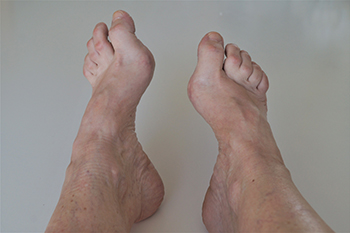
Plantar fasciitis involves inflammation of the thick band of tissue that runs along the bottom of the foot, connecting the heel to the toes. This tissue, called the plantar fascia, supports the arch and absorbs shock during movement. When it becomes irritated or strained, sharp heel pain can develop, especially during the first steps in the morning or after long periods of rest. This discomfort can make walking difficult and alter the natural gait, leading to further strain on the feet and legs. Factors that can worsen plantar fasciitis include standing for extended periods, wearing shoes with inadequate support, having flat feet or high arches, and engaging in repetitive activities. If you have heel pain, it is suggested that you promptly contact a podiatrist who can offer appropriate treatment solutions.
Plantar fasciitis can be very painful and inconvenient. If you are experiencing heel pain or symptoms of plantar fasciitis, contact Dr. Kevin Davis from Davis Foot & Ankle Centers. Our doctor can provide the care you need to keep you pain-free and on your feet.
What Is Plantar Fasciitis?
Plantar fasciitis is the inflammation of the thick band of tissue that runs along the bottom of your foot, known as the plantar fascia, and causes mild to severe heel pain.
What Causes Plantar Fasciitis?
- Excessive running
- Non-supportive shoes
- Overpronation
- Repeated stretching and tearing of the plantar fascia
How Can It Be Treated?
- Conservative measures – anti-inflammatories, ice packs, stretching exercises, physical therapy, orthotic devices
- Shockwave therapy – sound waves are sent to the affected area to facilitate healing and are usually used for chronic cases of plantar fasciitis
- Surgery – usually only used as a last resort when all else fails. The plantar fascia can be surgically detached from the heel
While very treatable, plantar fasciitis is definitely not something that should be ignored. Especially in severe cases, speaking to your doctor right away is highly recommended to avoid complications and severe heel pain. Your podiatrist can work with you to provide the appropriate treatment options tailored to your condition.
If you have any questions please feel free to contact our office located in Springfield, TN . We offer the newest diagnostic and treatment technologies for all your foot and ankle needs.

A high arch, also known as pes cavus, occurs when the arch of the foot is excessively elevated. This condition may be inherited or linked to neurological disorders such as Charcot-Marie-Tooth disease, cerebral palsy, or spinal cord abnormalities. Symptoms include foot pain, instability, difficulty fitting into shoes, and excessive pressure on the ball and heel of the foot. High arches can lead to calluses, hammertoes, ankle instability, and an increased risk of stress fractures. Some individuals experience difficulty walking or standing for long periods due to inadequate shock absorption. In severe cases, medical intervention may be necessary to improve comfort. If you have high arches that are causing pain or discomfort, it is suggested that you contact a podiatrist who can help you to manage this condition, possibly by offering custom-made orthotics.
Foot Pain
Foot pain can be extremely painful and debilitating. If you have a foot pain, consult with Dr. Kevin Davis from Davis Foot & Ankle Centers. Our doctor will assess your condition and provide you with quality foot and ankle treatment.
Causes
Foot pain is a very broad condition that could be caused by one or more ailments. The most common include:
- Bunions
- Hammertoes
- Plantar Fasciitis
- Bone Spurs
- Corns
- Tarsal Tunnel Syndrome
- Ingrown Toenails
- Arthritis (such as Gout, Rheumatoid, and Osteoarthritis)
- Flat Feet
- Injury (from stress fractures, broken toe, foot, ankle, Achilles tendon ruptures, and sprains)
- And more
Diagnosis
To figure out the cause of foot pain, podiatrists utilize several different methods. This can range from simple visual inspections and sensation tests to X-rays and MRI scans. Prior medical history, family medical history, and any recent physical traumatic events will all be taken into consideration for a proper diagnosis.
Treatment
Treatment depends upon the cause of the foot pain. Whether it is resting, staying off the foot, or having surgery; podiatrists have a number of treatment options available for foot pain.
If you have any questions, please feel free to contact our office located in Springfield, TN . We offer the newest diagnostic and treatment technologies for all your foot care needs.

Running places significant stress on the feet and toes, making them prone to injury, especially over long distances or running downhill. One common issue is runner’s toe, medically known as a subungual hematoma, which develops when the toenail repeatedly strikes the inside of your shoe. This can lead to bleeding beneath the nail, resulting in changes in nail color, pain, and sometimes nail loss. Poorly fitting running shoes, tight socks, and heat-induced foot swelling can increase the risk. The big toe is most often affected, but the second through fifth toes may also suffer damage from shoe pressure or toe-on-toe friction. In some cases, the nail becomes thick, loose, or may fall off entirely. Repeated trauma may also lead to fungal infection or nail deformity. A podiatrist can assess the extent of the injury and determine if the nail bed or bone has been affected. Treatment includes draining any fluid buildup or in some cases removing the damaged nail. If you have problematic or painful toes that impede your running activities, it is suggested that you schedule an appointment with a podiatrist for an exam and appropriate treatment.
Toe pain can disrupt your daily activities. If you have any concerns, contact Dr. Kevin Davis of Davis Foot & Ankle Centers. Our doctor can provide the care you need to keep you pain-free and on your feet.
What Causes Toe Pain?
Most severe toe pain is caused due to a sports injury, trauma from dropping something heavy on the toe, or bumping into something rigid. Other problems can develop over time for various reasons.
Toe pain can be caused by one or more ailments. The most common include:
- Trauma
- Sports injury
- Wearing shoes that are too tight
- Arthritis
- Gout
- Corns and calluses
- Hammertoe
- Bunions
- Blisters
- Ingrown toenails
- Sprains
- Fractures (broken bones)
- Dislocations
When to See a Podiatrist
- Severe pain
- Persistent pain that lasts more than a week
- Signs of infection
- Continued swelling
- Pain that prevents walking
Diagnosis
In many cases the cause of toe pain is obvious, but in others, a podiatrist may want to use more advanced methods to determine the problem. These can range from simple visual inspections and sensation tests to X-rays and MRI scans. Prior medical history, family medical history, and any recent physical traumatic events will all be taken into consideration for a proper diagnosis.
Treatment
Treatments for toe pain and injuries vary and may include shoe inserts, padding, taping, medicines, injections, and in some cases, surgery. If you believe that you have broken a toe, please see a podiatrist as soon as possible.
If you have any questions please feel free to contact our office located in Springfield, TN . We offer the newest diagnostic tools and technology to treat your foot and ankle needs.

